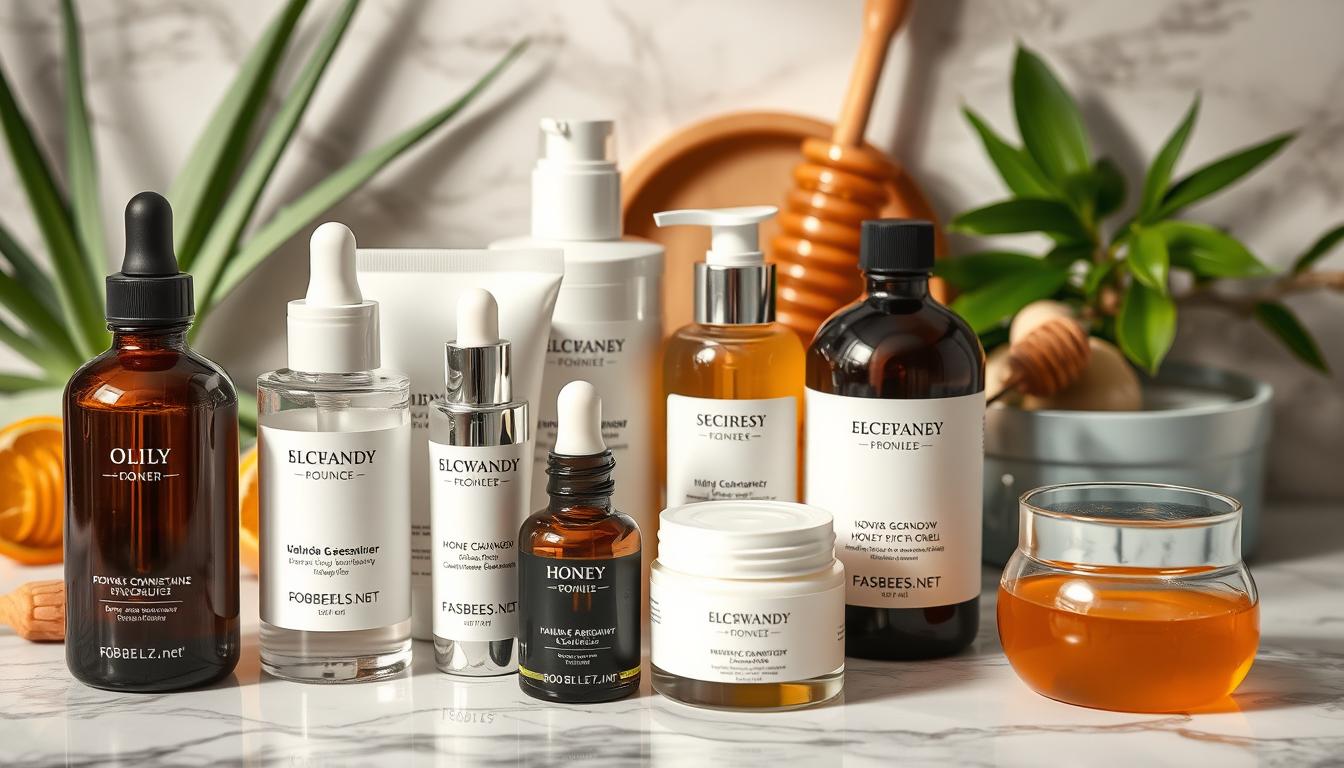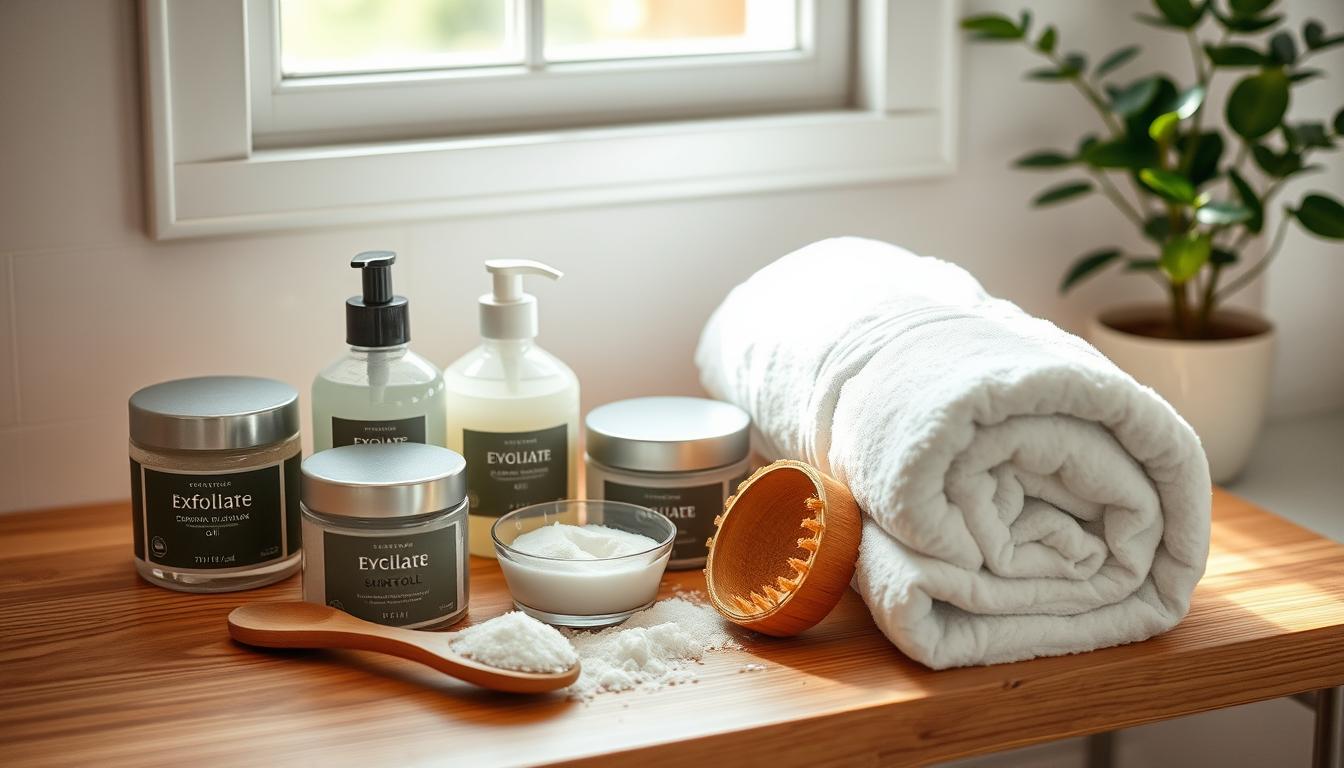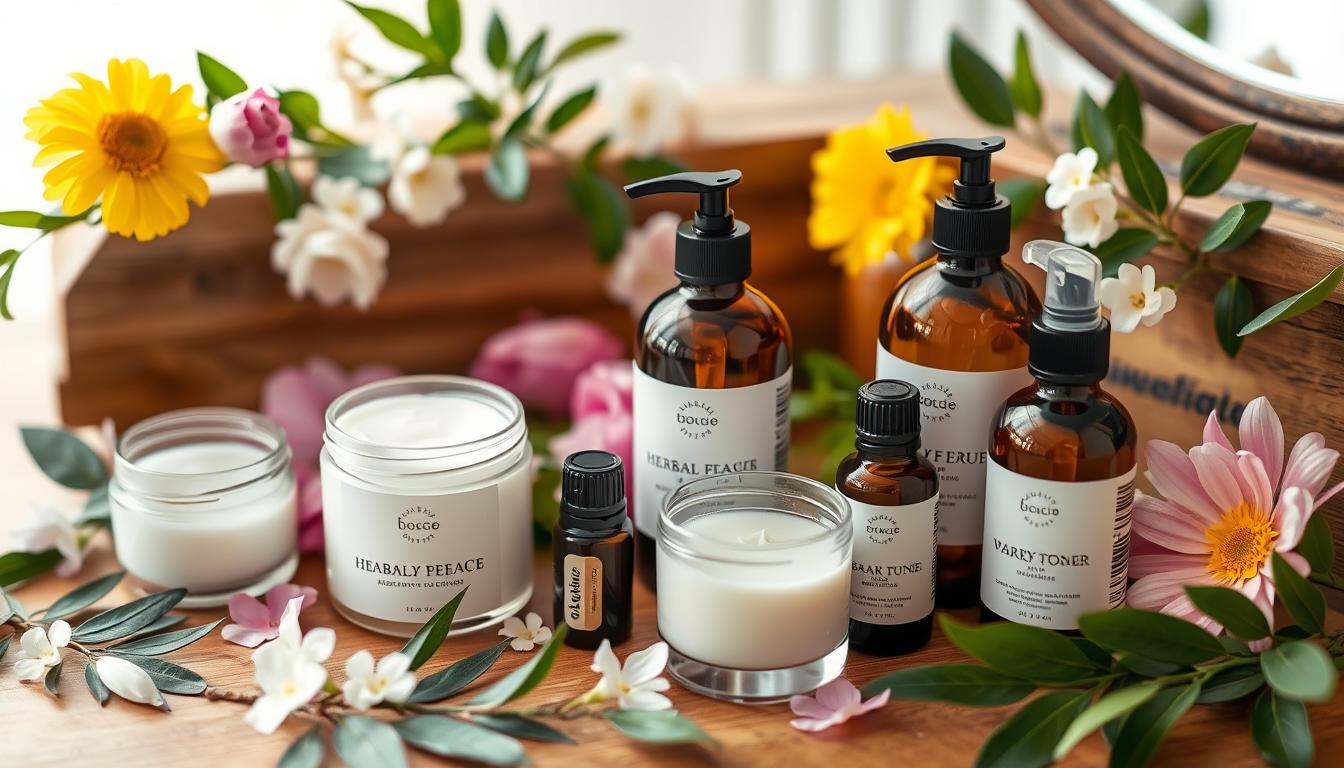Finding the right skincare routine can be tough. There are so many products and treatments out there. Remember, everyone’s skin is different. What works for one might not work for another.
We’re here to help you find the perfect skincare routine for your skin type. We’ll give you professional tips to make your routine work for you.
Sun damage is a big problem for our skin. It causes wrinkles, age spots, and uneven skin tone. In the morning, use vitamin C to help with collagen and fading spots.
Expert dermatologists say moisturizing, exfoliating, and sun protection are key. These steps will help you get a radiant glow.
Key Takeaways
- A good skincare routine includes a gentle cleanse, a treatment for your skin type, and a moisturizer.
- Exfoliate once a week to avoid too much oil or breakouts.
- Always use SPF 30 or higher to prevent sun damage, for all skin tones.
- Drink plenty of water and eat hydrating foods to keep your skin healthy.
- Double cleansing can remove up to 99% of makeup with the right oil or balm.
- Retinoids and vitamin C serums can reduce fine lines, wrinkles, and boost collagen.
Understanding Different Skin Types
Knowing your skin type is key for good skincare. There are four main types: oily, dry, combination, and normal. Each needs its own care, like sensitive skin.
Oily skin happens when you make too much sebum. This can be due to stress, humidity, or hormones. A study shows oily skin might have fewer wrinkles than other types.
Dry skin has less sebum, leading to dehydration. This causes flakiness and a rough texture. Combination skin has an oily T-zone and drier areas, changing with seasons and hormones.
To find your skin type, watch how it looks after cleansing. Or use a blotting sheet to see how much oil it absorbs. This helps figure out if you have oily, dry, combination, or normal skin. Knowing your type helps you get healthy, glowing skin.
- Oily skin: large pores, increased oil production, prone to acne
- Dry skin: lack of moisture, flakiness, irritation, signs of premature aging
- Combination skin: oily T-zone, drier areas, variability influenced by seasonal changes and hormonal fluctuations
- Normal skin: balanced, hydrated, and comfortable appearance without specific concerns like acne or redness
By following these tips and knowing your skin type, you can get a radiant and healthy complexion.
Essential Skincare Routine for All
For the best skincare, a consistent routine is vital. It should include cleansing, moisturizing, and protecting from the sun. Renée Rouleau suggests a gentle cleanser and a moisturizer with SPF for balanced skin. We’ll look at the key steps in a daily skincare routine and how to tailor it to your skin type and concerns.
The American Academy of Dermatology says a consistent routine is key. This means using a non-comedogenic moisturizer to avoid clogged pores and a broad-spectrum sunscreen with SPF 30 or higher to protect against UV damage. Following a dermatologist’s advice can lead to healthy and glowing skin.
- Gentle, sulfate-free cleanser
- Moisturizer with SPF
- Broad-spectrum sunscreen with SPF 30 or higher
By adding these products to your daily routine, you can create a skincare plan that fits your unique needs and concerns.
| Product | Recommended Use |
|---|---|
| Gentle, sulfate-free cleanser | Twice a day, morning and night |
| Moisturizer with SPF | Once a day, in the morning |
| Broad-spectrum sunscreen with SPF 30 or higher | Reapply every 2 hours while spending time outdoors |
Cleansing: Choosing the Right Cleanser
Choosing the right cleanser is key for men’s skincare. A good cleanser removes dirt and leaves skin feeling fresh. For anti-aging, pick a gentle, non-comedogenic cleanser. Harsh products can harm your skin and cause early aging.
Dr. Corey L. Hartman suggests a gentle cleanser for acne-prone skin. You can choose from gel, cream, or oil-based cleansers. Gel cleansers are great for oily skin, while cream cleansers are better for dry skin.
Gel vs. Cream Cleansers
Gel cleansers are good for oily skin as they control shine and pores. Cream cleansers are better for dry or sensitive skin. They help keep moisture in and soothe irritation.
How Often Should We Cleanse?
Cleansing frequency varies based on skin type. Most people should cleanse twice a day. But, oily skin might need more, while dry skin might need less.
- Choose a cleanser that matches your skin type.
- Avoid harsh ingredients that can harm your skin.
- Look for a cleanser with a pH level between 5.5 and 6.5.
| Cleanser Type | Skin Type | Benefits |
|---|---|---|
| Gel | Normal, Oily, Combination | Controls shine, reduces pores |
| Cream | Dry, Sensitive | Locks in moisture, soothes irritation |
| Oil-based | Normal, Dry, Sensitive | Nourishes and hydrates the skin |
Moisturizing: Finding the Perfect Match
Finding the right moisturizer is key for your skin. Dr. Jessica Wu suggests using one with hyaluronic acid and ceramides for dry skin. Knowing your skin type and needs is vital. Natural skincare remedies can help keep your skin healthy and glowing.
First, figure out your skin type. There are five main types: normal, combination, dry, oily, and sensitive. Each needs a different moisturizer. For example, dry skin needs a thick, gentle, and fragrance-free moisturizer. Oily skin does better with a light, oil-free one.
Moisturized skin looks 30% younger. So, pick a moisturizer that hydrates and protects well. CeraVe Moisturizing Cream is good for dry skin, while CeraVe Ultra-Light Moisturizing Gel works for oily skin.
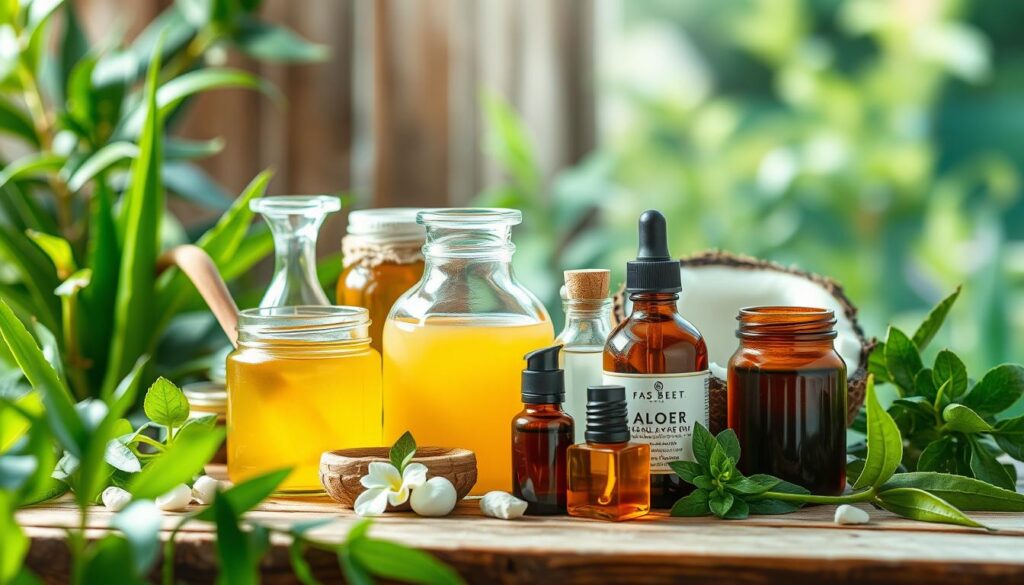
Choosing the right moisturizer is key to healthy, radiant skin. Always check the labels for products that match your skin type. With the right natural skincare remedies and knowledge of your skin type, your skin will look its best.
| Skin Type | Recommended Moisturizer |
|---|---|
| Dry Skin | CeraVe Moisturizing Cream |
| Oily Skin | CeraVe Ultra-Light Moisturizing Gel |
| Combination Skin | Gentle, non-comedogenic moisturizer |
| Sensitive Skin | Hypoallergenic, fragrance-free moisturizer |
Sun Protection: A Must for Everyone
As we talk about professional skincare tips for all skin, sun protection is key. Dr. Elizabeth K. Hale says use a broad-spectrum sunscreen with at least SPF 30 every day. But what does SPF mean, and how do we use sunscreen right?
SPF stands for Sun Protection Factor. It shows how well a sunscreen blocks UVB rays. For example, SPF 30 blocks about 97% of UVB rays. When picking a sunscreen, think about your skin type and how much protection you need. If your skin is sensitive, choose a mineral sunscreen that’s gentle.
To apply sunscreen right, use about one ounce (the amount that fills your palm) for your face, neck, arms, and legs. Reapply every two hours, or after swimming or sweating. Here are some extra tips to remember:
- Seek shade during peak UV hours (10 a.m. – 2 p.m.)
- Use a broad-spectrum sunscreen with at least SPF 30
- Apply sunscreen 15-30 minutes before going outside
- Reapply sunscreen every two hours or after swimming or sweating
By following these professional skincare tips for all skin types and adding sun protection to our daily skincare routine for different skin types, we can lower skin cancer risk. We also keep our skin healthy and glowing.
Exfoliation: Key to Radiant Skin
Exfoliation is key to a healthy, glowing complexion. It removes dead skin cells, revealing smoother skin. For sensitive skin, it’s vital to follow specific tips to avoid irritation.
There are two main types of exfoliants: mechanical and chemical. Mechanical exfoliants, like scrubs, remove dead skin cells physically. Chemical exfoliants, including alpha-hydroxy acids (AHAs) and beta-hydroxy acids (BHAs), break down the “glue” that holds dead skin cells together. Dr. Dendy Engelman says chemical exfoliants can brighten and smooth the skin.

How often to exfoliate depends on your skin type. Oily skin benefits from exfoliating two to three times a week. Normal or combination skin can exfoliate once or twice a week. Dry or sensitive skin should exfoliate once a week or every two weeks. For more on exfoliation, check out this guide to glowing skin.
Choosing the Right Exfoliant
Choose an exfoliant based on your skin type and concerns. Alpha-hydroxy acids are great for dry skin, while beta-hydroxy acids are better for oily and acne-prone skin. Enzyme exfoliation is gentler, making it good for sensitive skin. Always follow sensitive skin tips to avoid irritation.
Frequency of Exfoliation
Exfoliation frequency varies based on individual skin needs. Regular exfoliation can improve skin texture by up to 30% in 4 weeks. It can also reduce fine lines by 10-20% after 12 weeks. But, over-exfoliating can cause irritation. Start with twice a week and adjust as needed.
Targeted Treatments: Addressing Specific Concerns
For healthy and radiant skin, best skincare practices are key. Each skin type needs its own care. For example, those with acne should use products with salicylic acid and benzoyl peroxide, Dr. Roberta Del Campo suggests.
A good skincare routine for different skin types can really help. It’s about using the right products for your skin. Whether it’s normal, dry, oily, combination, or sensitive, the right products can make a big difference. By following best skincare practices, your skin’s health and look can improve a lot.
Some important ingredients to look for in treatments are:
- Salicylic acid and benzoyl peroxide for acne-prone skin
- Retinoids and peptides for anti-aging concerns
- Vitamin C and niacinamide for hyperpigmentation
By sticking to best skincare practices and a skincare routine for different skin types, you can get the radiant glow you’ve always wanted. Always talk to a skincare expert to find the best treatment for your skin.
| Skin Type | Recommended Products |
|---|---|
| Acne-prone | Salicylic acid and benzoyl peroxide |
| Dry | Hyaluronic acid and ceramides |
| Oily | Oil-control products with salicylic acid |
Hydration: Internal and External
Hydration is key for healthy, radiant skin. Drinking at least eight glasses of water a day is vital. Dr. Whitney Bowe says it’s essential for skin health.
Drinking water is just as important as using moisturizers. Look for products with hyaluronic acid. It can hold up to 1000 times its weight in water, giving your skin a plumping effect.
Here are some tips for keeping your skin hydrated:
- Drink at least eight glasses of water a day
- Use moisturizers twice a day to maintain hydrated skin
- Apply hydrating masks 1-2 times a week to restore moisture
By following these tips, you can have healthy, hydrated, and radiant skin. Hydration helps keep your skin elastic and reduces aging signs.
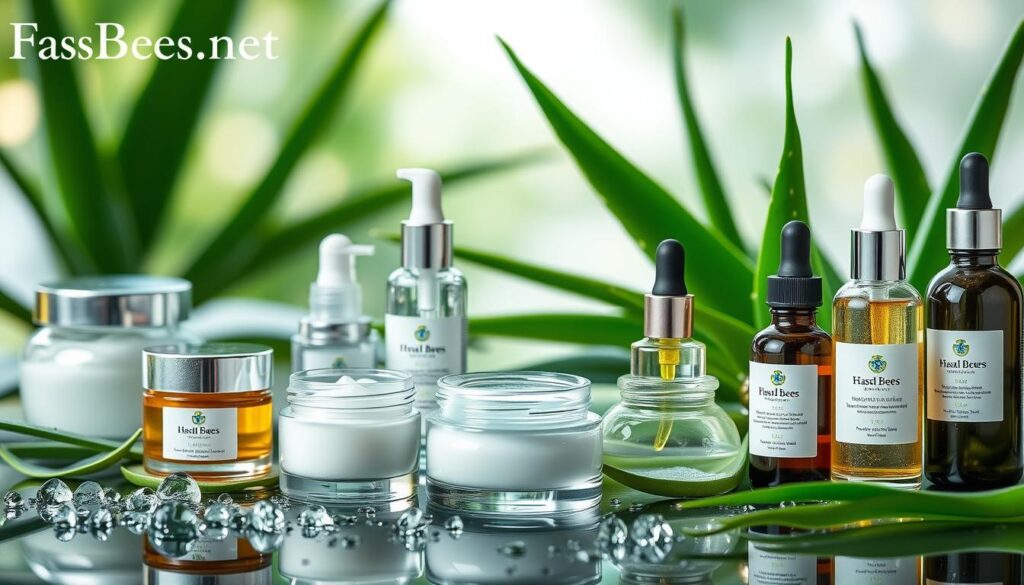
Combining internal and external hydration is the secret to great skin. Drink plenty of water and use hydrating products for that radiant glow.
| Product | Benefits |
|---|---|
| Hyaluronic Acid | Provides significant hydration and plumping effects |
| Moisturizers | Maintains hydrated skin and reduces signs of aging |
Seasonal Skin Care Adjustments
As we move from one season to another, our skin care needs change too. Dr. Nkem Ugonabo says it’s key to adjust our routine for temperature and humidity changes. Natural skincare remedies are great for keeping our skin healthy and glowing.
First, we need to how to identify your skin type and what it needs. In winter, our skin gets drier. In summer, it gets oilier. Knowing this helps us tackle specific skin issues like dryness or oiliness.
Here are some tips for seasonal skincare adjustments:
- Use lightweight moisturizers during summer to avoid clogged pores
- Exfoliate regularly to remove dead skin cells and improve skin texture
- Apply broad-spectrum sunscreen with SPF 30 or higher to protect against UV damage
By using natural skincare remedies and knowing how to identify your skin type, we can tailor our skincare to each season. Stay hydrated, use gentle products, and protect your skin from the sun for a healthy glow.
| Season | Skin Concerns | Skincare Tips |
|---|---|---|
| Winter | Dryness, sensitivity | Use rich moisturizers, avoid harsh products |
| Summer | Oiliness, sun damage | Use lightweight moisturizers, apply sunscreen regularly |
Natural Remedies: Pros and Cons
Natural remedies are a popular choice for skincare. Ingredients like honey and avocado are known for their moisturizing and soothing effects. Dr. Dhaval Bhanusali suggests adding these to your skincare routine.
Choosing the right skincare depends on your skin type and concerns. Natural ingredients can be good, but they might not work for everyone. Some can even cause irritation or allergic reactions. Always test new products on a small area first.

- Aloe vera for its soothing and anti-inflammatory properties
- Tea tree oil for its antibacterial and antifungal properties
- Coconut oil for its moisturizing and nourishing properties
Remember, natural remedies aren’t for everyone. It’s important to talk to a dermatologist or skincare expert. They can help you find the best skincare routine for your skin type and concerns.
Skincare Myths Debunked
Skincare can be confusing with all the myths out there. Dermatologists help us know what’s true and what’s not. For example, oily skin does need moisturizer, says Dr. Dendy Engelman. A light moisturizer can even help control oil.
It’s also a myth that anti-aging products are only for older people. Starting early in your 20s can make a big difference. Following dermatologist recommended skincare tips like using sunscreen and avoiding tanning can prevent aging and skin cancer.
By clearing up these myths, we can make a skincare routine that suits our skin. Whether your skin is oily, dry, or sensitive, there are tips to help. Always choose gentle, fragrance-free products and avoid hot water to keep your skin healthy.
Trends in Skincare: What’s Hot Right Now
As we wrap up our look at the best skincare practices, it’s thrilling to dive into the latest trends. Experts say the skincare world is changing fast. New ingredients, eco-friendly formulas, and custom solutions are leading the way.
Embracing Clean Beauty and Sustainable Practices
The clean beauty trend is booming. More brands are using natural, green ingredients and reducing their harm to the planet. People want products that work well and match their values. Brands are stepping up, creating clean products with special features to stand out.
Personalization and Technology-Driven Skincare
Artificial intelligence and data are changing skincare. Now, we can get routines tailored to our skin. This lets us tackle our specific skin issues better. As we go on, expert advice will play a bigger role, thanks to micro-influencers and pros.
Despite changes, our goal remains the same: to have healthy, glowing skin. By keeping up with trends and using the best practices, our skin stays young and vibrant. This is true even as we age.

